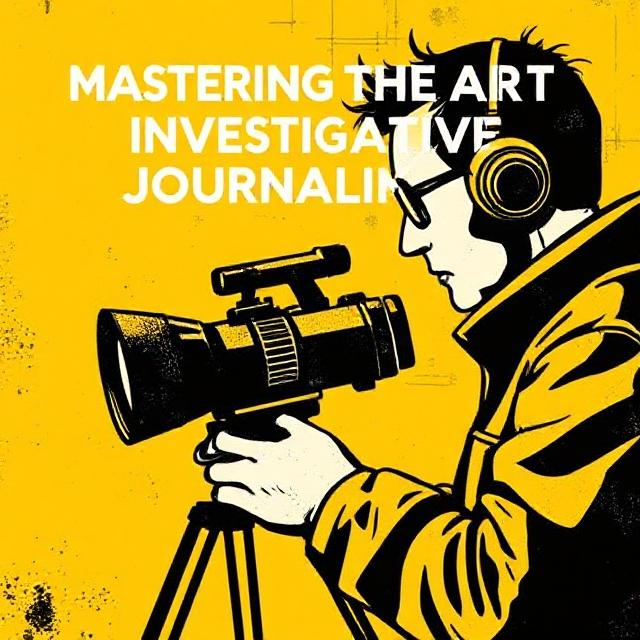
Investigative journalism is the cornerstone of holding power accountable and bringing hidden truths to light. It plays a crucial role in exposing corruption, uncovering wrongdoing, and giving a voice to the voiceless. Mastering this art requires a combination of skills, ethical adherence, and an unwavering commitment to uncovering the truth. This article explores the essential components of investigative journalism and provides a roadmap for aspiring investigative journalists.
What is Investigative Journalism?
Investigative journalism goes beyond reporting the day’s events. It involves deep-dive reporting that uncovers information not readily available to the public. The goal is to reveal facts that someone, usually with power or influence, is trying to conceal. This form of journalism often results in long-form articles, documentaries, or exposés that have a significant social impact.
Examples of Notable Investigative Journalism
- Watergate Scandal – Exposed by The Washington Post’s Bob Woodward and Carl Bernstein.
- Panama Papers – A global investigation into offshore accounts used by the wealthy to hide assets.
- Spotlight Investigation – The Boston Globe’s investigation into child abuse within the Catholic Church.
Skills Required for Investigative Journalism
Mastering investigative journalism demands a diverse set of skills. These include:
1. Research and Analytical Skills
The foundation of investigative journalism is research. Reporters must be able to gather, analyze, and verify information from multiple sources.
2. Interviewing Techniques
Successful investigative journalists know how to conduct interviews that yield valuable information. This requires building trust with sources and asking the right questions.
3. Persistence and Patience
Investigative stories can take months or even years to develop. Journalists must be relentless in their pursuit of the truth and willing to face obstacles.
4. Ethical Judgment
Journalists must navigate ethical dilemmas with integrity, ensuring that their methods are above reproach and that they do not cause undue harm.
5. Legal Knowledge
A basic understanding of media law is essential to avoid legal risks like defamation and libel while protecting whistleblowers and confidential sources.
The Investigative Process
The investigative journalism process can be broken down into several key steps:
1. Choosing the Right Story
A good investigative story often involves an element of injustice, corruption, or abuse of power. Ask yourself:
- Is this story in the public interest?
- Is there evidence to support the investigation?
2. Building a Plan
An investigation requires meticulous planning. This includes identifying sources, documents to obtain, and the questions that need answering.
3. Collecting Evidence
Evidence can come from multiple sources, including:
- Public records (court documents, financial records, government data)
- Whistleblowers and confidential informants
- On-the-ground observation
- Data analysis
4. Verification and Fact-Checking
Every piece of information must be cross-checked with reliable sources. Verifying facts ensures the story’s credibility and protects against legal repercussions.
5. Writing and Structuring the Story
A well-written investigative report is clear, engaging, and factual. It should present the findings in a compelling narrative that captures the reader’s attention while highlighting the broader impact.
Ethics in Investigative Journalism
Investigative journalism must adhere to strict ethical standards. Key principles include:
- Accuracy and Fairness: Every effort must be made to ensure the information is accurate and balanced.
- Protection of Sources: Confidential sources must be protected, especially when their safety is at risk.
- Avoiding Conflicts of Interest: Journalists must maintain independence and avoid personal or financial conflicts that could compromise their work.
- Minimizing Harm: While exposing wrongdoing is crucial, journalists must weigh the potential consequences of their reporting on individuals and communities.
Challenges of Investigative Journalism
Investigative journalism is not without its risks. Reporters face numerous challenges, including:
- Legal Threats: Investigative journalists often face lawsuits, even when their reporting is accurate.
- Safety Risks: In some regions, exposing corruption or powerful figures can put journalists in danger.
- Access to Information: Governments and corporations may withhold critical documents or restrict access to data.
- Financial Constraints: Investigative journalism is resource-intensive, and not all media organizations can afford to support long-term projects.
The Impact of Investigative Journalism
When done effectively, investigative journalism can lead to significant societal changes. It can spark government reforms, bring justice to victims, and raise awareness of critical issues. For instance:
- The Watergate investigation led to the resignation of U.S. President Richard Nixon.
- The Panama Papers investigation resulted in tax reforms and legal action worldwide.
- The Spotlight investigation transformed how the Catholic Church handles abuse cases.
Mastering the art of investigative journalism is a lifelong pursuit that requires dedication, skill, and courage. It is not an easy path, but the rewards are immense. Investigative journalists have the power to shine a light on the darkest corners of society and make a lasting impact on the world. By adhering to ethical principles, developing critical skills, and embracing the challenges, aspiring journalists can contribute meaningfully to this vital profession.

